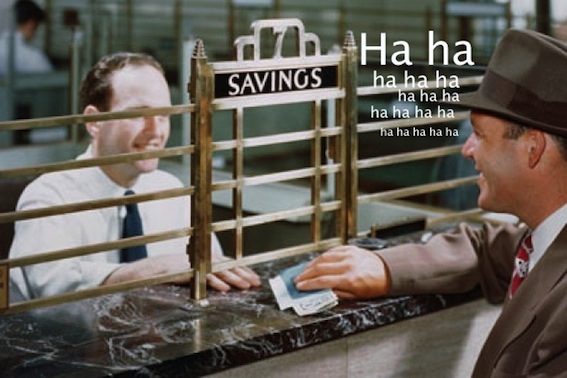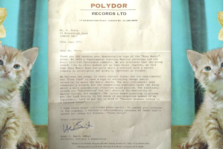We’ve been ‘laughing all the way to the bank’ for decades now – but we used to be crying. Tony Barrell examines a well-worn phrase
SEPTEMBER 2019
When did you last take a pile of money to your bank? And were you chuckling or cackling during the whole journey? If so, you would have been “laughing all the way to the bank”. But this expression is rarely literal: it’s generally used as a criticism of somebody who is seen as “coining it” with very little effort, or “making a packet” from a ridiculously simple idea. Overpaid footballers are often the target, as are conceptual artists, accused of earning a ton of money from old rope. Simon Cowell, the Hughie Green de nos jours who has become ridiculously wealthy via some tatty old talent shows, is surely guffawing all the way to NatWest as I write.
I find it amusing that you can still “laugh all the way to the bank” nowadays, when many of our old bank branches have closed down, repurposed as pubs and coffee shops, and billions of us do our banking online.
In the earliest uses of the line, people weren’t laughing but crying all the way to the bank
The phrase originated in the USA, and its history is interesting. In the earliest known uses of the line, people weren’t laughing but crying. This gave it a more sarcastic flavour, with “crying all the way to the bank” being used by the supposed bank-visitor to mean: “What do I care? I’m fabulously rich.” This version turned up in the movies in 1959, in the first-person plural. When we first meet Cary Grant as businessman Roger Thornhill in Alfred Hitchcock’s North by Northwest, he is rapidly dictating a letter to his secretary as they leave an office building. “And let the opposition have their high ratings, while we cry about it all the way to the bank,” he gabbles.
Liberace was fond of the line; the American entertainer, with his dazzling costumes, ear-to-ear smile and ostentatious piano style, would wheel it out to answer his critics. “When the reviews are bad,” he said in his autobiography, “I tell my staff that they can join me as I cry all the way to the bank.” But a press cutting from 1946, before Liberace was famous, shows that he wasn’t the first person to use the idiom. The Waterloo Daily Courier, published in Iowa, was reporting on a personality in the world of boxing. “Eddie Walker perhaps is the wealthiest fight manager in the game,” it claimed. “The other night when his man Belloise lost, Eddie had the miseries… He felt so terrible, he cried all the way to the bank!” Of course, this doesn’t prove that either Walker or the reporter invented the line: it may already have been in circulation as a verbal expression, waiting to be put down in print.
It’s possible that our language has been subtly influenced by the song Jingle Bells
By some point around the mid-20th century, people were using a slightly different version, with laughter replacing tears. Liberace himself is recorded as claiming he “laughed all the way to the bank” on at least one occasion. Both the “crying” and “laughing” versions of the metaphor remained in circulation for a while. But these days, the fashion for bank-bound weeping seems to have nearly died out altogether, and most people are roaring with laughter as they tramp the streets towards Barclays or Coutts. It’s possible that our everyday language has been subtly, subconsciously influenced by the line “laughing all the way” in that 19th-century Christmas favourite ‘Jingle Bells’, which is one of the most famous and most performed songs in the world.
But personally, and perhaps ironically, I think “crying all the way to the bank” is a funnier line. So the next time you hit on a scheme to make yourself extremely wealthy, you should try weeping instead of chortling as you approach the grand old building housing the financial institution that looks after your cash. ♦
© 2019 Tony Barrell
Tony Barrell is a writer, pop historian and etymologist who has investigated other popular expressions, such as “hunky dory”, “over the moon”, “hanky panky“, “litterbug”, “Planet Zog”, and “Without further ado”.









0 comments found
Comments for: FUNNY PECUNIOUS